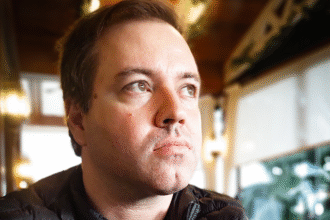Jorge Antonio Salem , son-in-law of the late cattle driver João Azevedo, better known as João Boiadeiro, has published the book “Memórias de um Tropeiro” (Memoirs of a Tropeiro) to immortalize his father-in-law’s stories and pay tribute to the Azevedo family’s trajectory. The work, which records João Boiadeiro’s adventures on the roads of Brazil and neighboring countries during the 1950s, also provides a detailed portrait of cattle driving and its historical and cultural importance for the country.
Can you share with us how the idea of turning the recordings made with João Azevedo into a book came about? What motivated you to immortalize these stories?
For many years, I lived next door to my father-in-law João Azevedo. Almost every day, I would come home and, together with my wife, we would go to his house to see how the couple was doing. Sitting in the living room, in his grandpa’s chair, watching television, I would always interrupt with a question, encouraging him to talk about his life as a cattle driver. I thought that one day we would not have him to tell these stories. Who would tell the great-grandchildren who were coming and would still come? In September 2020, he passed away at the age of 95. The Covid-19 pandemic was also taking hold that year. In March 2021, my wife, who was undergoing chemotherapy for cancer, died of Covid-19. It was a great sadness and I saw the need to pay tribute to both of them. Both my father-in-law and my wife. This way, these stories would be immortalized and, in addition to the grandchildren and great-grandchildren, other people could enjoy these stories.
What were the biggest challenges you encountered when transcribing and organizing João Boiadeiro’s memoirs for publication?
Many of these recordings and stories were cut. When we were in a circle, at Sunday lunches, we would talk about the subject and someone would come up and ask about a different situation that was not the case. This would hinder the telling of the story. There were many times when I would start recording a story and stop. One challenge was to search through all the recordings for the sequence of the stories. Another was to look for information that could confirm the veracity of these stories. Many times he would say that he had loaded the cattle at a certain train station and I had to do a lot of research on the internet to verify this existence. Distance between the farm and the city. Presence of the rivers that he had passed.
How did you prepare to write the book? Was there any specific aspect of João Azevedo’s life that you found most interesting or impactful?
At first I just wrote it. But the process took a little longer when I decided to actually publish it. I showed it to a friend and professor Arnaldo Zubioli , who is also a writer, so that he could write a preface for the book. He said that it was not advisable to publish a work with less than seven corrections, and I followed his suggestion. There were seven corrections and two more professional corrections.
My father-in-law João Azevedo was always a very energetic person, and I believe that this helped him not to give up. He was independent and the story of him jumping into the Paraná River to save a horse showed his love for animals. He always had a lot of affection for the dogs and animals he had on his farm.
What was the process like of revisiting the cities and places mentioned in João Azevedo’s stories to bring more authenticity to the book?
It was a wonderful trip. I took five days off for these visits. I visited all the cities in Paraná that were part of the Viamão-Sorocaba route. I took photos, visited museums, farms that once welcomed the tropeiros, and visited places where the troops were in great danger. I bought books that told the history of the region. With this fact, the work establishes a vehicle for studying the history of tropeiros in Brazil and Paraná, in addition to entertaining people with stories of my father-in-law’s experiences.

Did you find any stories or details in João Azevedo’s accounts that stood out to you while writing the book?
Each story has a special moment. However, the story of when he was bringing cattle from Mato Grosso and because of a delay in collecting the cattle, the arrival date in Nova Esperança was compromised. It would be his eldest son’s wedding. So, in order for him to arrive, he left a 14-year-old son to follow the troop, bringing the cattle and he came faster ahead. He trusted his employees who would take care of his son and trusted his son who would bring the troop to Nova Esperança, leading this entourage.
The book is written in the first person, from João Azevedo’s point of view. How did you work to capture his voice and narration style?
I never told him that I was recording some of the stories. I think it was more natural that way. Once, I tried to record it, showing him that I had my cell phone in my hand. He got very tense. He didn’t talk much, which is natural for a person. But when I turned on the phone without him knowing, he would relax, laugh, and tell everything very spontaneously. Writing the book in the first person was another way of paying homage to him. Those who read it feel the emotion that we felt when we listened to him telling the stories.
Do you believe that the story of João Azevedo and the tropeirismo is relevant to the understanding of the cultural and economic formation of Brazil? How do you see this contribution?
The tropeiros were essential in opening several roads and forming villages that became cities. In the beginning, the tropeiros were drivers of animals, but also of news for many people. Some, tired of this life, started families in various stops on farms. From there, they opened businesses and encouraged the region to grow. At the time when my father-in-law was a tropeiro, transporting cattle and mules by truck was practically impossible. Bringing these animals through the Pantanal of Mato Grosso. In the 50s to 70s, few roads were paved. Taking improvised cuisine to various regions of Brazil, but one that satisfied hunger.
How do you hope readers will connect with the book and João Azevedo’s story? What would you like them to take away from reading it?
Every time I talk to a reader, I tell them to read slowly, putting themselves in each story and trying to live the moments they went through. Getting up before the sun, drinking a local coffee, walking slowly along the paths, seeing the landscapes and rivers. They experienced many good things. They also felt the bad situations, like the cold, the rain, walking for days in the flooded Pantanal. Many times, we complain about a little cold or rain, making it seem like we are very unhappy, but these people did not give up. They always kept moving forward. We have to take them as an example and stop complaining about everything that happens to us.
Follow Jorge Antonio Salem on Instagram





